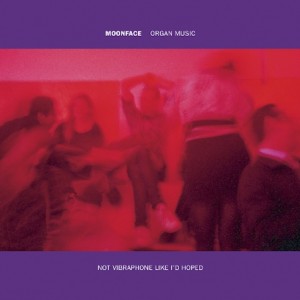Spencer Krug has always struck me as a somewhat reluctant rock star. As co-frontman in Wolf Parade, he was ‘the one with the weird voice’, responsible for the more complex arrangements, happy to leave the big anthemic pop songs and traditional lead-singer posturing to the more confident Dan Boeckner. As part of the ‘Canadian indie supergroup’ Swan Lake, his contributions were far subtler than the Bowie-esque theatrics of his co-conspirators, Destroyer’s Dan Bejar and Frog Eyes’ Carey Mercer, whilst even Sunset Rubdown evolved from a decidedly DIY solo project into a full-band affair once it started to take off. Oddly for such a prolific and revered musician, Krug has always seemed content to conceal himself in a group and let others hog the spotlight; to sit behind a piano and concern himself with the finer details rather than take his rightful place centre-stage.
With Moonface, the latest and – if the singer himself is to be believed – last in a long line of aliases, there is really nowhere for Krug to hide. The project’s first fruits, last year’s Dreamland EP, helpfully subtitled Marimba and Shitdrums, was an epic 25-minute track featuring the singer backed only by the titular wood-blocks and shoddily-recorded percussion. The name of this full-length follow-up – Organ Music Not Vibraphone Like I’d Hoped – is similarly self-explanatory; after abandoning the idea of recording a whole album using just a vibraphone, Krug sought out an old double-manual organ and hooked it up to a rotating Leslie speaker with a view to composing a series of ‘lush drone’ pieces. Somewhere along the way, though, it seems his natural instinct for melody fought its way to the surface, producing a mixed bag of results; those fearing a self-indulgent mess wouldn’t be entirely incorrect, but it does also include some of Krug’s poppiest moments to date.
Of course, the definition of pop round these parts is pretty far from the accepted mainstream version. But if – like me – you wake up with Suicide’s ghostly doo-wop lodged in your brain or find yourself shuffling around the living room in a trance-like state to Neu!’s hypnotic boogie, then parts of Organ Music… might just fill you with the kind of joy usually exhibited by single ladies at a Beyonce concert. Take, for example, the album’s glowing centrepiece ‘Fast Peter’, a track that eschews Krug’s usual quasi-fantastical subject matter in favour of lyrics about a guy and a girl on the other side of the world who "he thinks of when he thinks of love"; two colliding keyboard lines, one pulsing frantically, the other gliding gracefully, pinned together by a basic pre-set rhythm track approximation of the famous Dinger-beat and one of Krug’s most effective, affecting melodies. It’s a pretty remarkable achievement, the undisputed highlight of the album – and, quite possibly, Krug’s career thus far.
There are other stand-out moments – the gut-wrenching key change towards the end of ‘Return To The Violence Of The Ocean Floor’, the frenzied crescendo of overlapping arpeggios at the climax of ‘Whale Song (Song Instead Of A Kiss)’ – but compared to the instant pop gratification of ‘Fast Peter’ they seem fleeting and, at times, somewhat hard-earned. With such a limited range of sounds to draw from, it was perhaps inevitable that a full-length record would struggle to hold the listener’s attention, and it is to its credit that only one track – ‘Shit-hawk In The Snow’, with its overly dramatic chord stabs and aimless, noodling solos – truly outstays its welcome. While the album is by no means a disappointment, one can’t help but long for the return of a less inhibited Krug, free of – albeit self-imposed – limitations.


